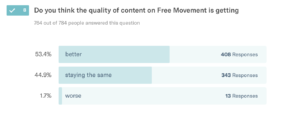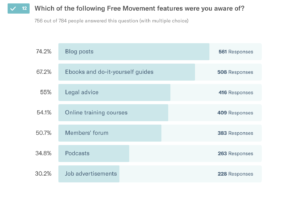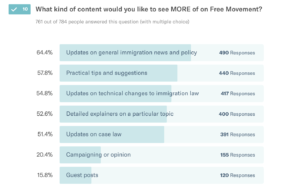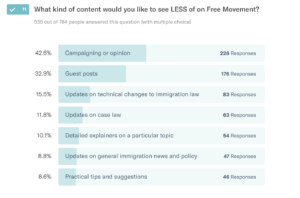- BY colinyeo

Free Movement reader survey 2018: the results are in
THANKS FOR READING
Older content is locked

A great deal of time and effort goes into producing the information on Free Movement, become a member of Free Movement to get unlimited access to all articles, and much, much more
TAKE FREE MOVEMENT FURTHER
By becoming a member of Free Movement, you not only support the hard-work that goes into maintaining the website, but get access to premium features;
- Single login for personal use
- FREE downloads of Free Movement ebooks
- Access to all Free Movement blog content
- Access to all our online training materials
- Access to our busy forums
- Downloadable CPD certificates
Table of Contents
ToggleMy sincere thanks to the hundreds of readers who filled in the Free Movement reader survey this year. The feedback was more positive than I dared hope for, and the suggestions for improvements wonderful.
Those interested can peruse the results for themselves. This post, running a severe risk of bragging, picks out a few of the most interesting trends. More importantly, it sets out how I intend to respond to the feedback as expressed in general preferences and specific comments. There were hundreds of the latter, and while each was read and considered, unfortunately I am not in a position to respond to all of them in this post.
I do respond to many of them, so this is necessarily a pretty long read.
Overview
The reader survey was published on 24 January 2018 and went out through the usual email and social media channels. There was no closing date for responses but when I came to crunch the numbers exactly three weeks later it had 782 responses and a 66% completion rate.
(A couple more responses have trickled in since I did the detailed analysis, so the all charts that follow reflect 784 responses rather than 782, but nothing much turns on that.)
The general feeling was overwhelmingly positive:

The average rating of 4.6 compares to averages of 4.5 and 4.4 in the two surveys I ran in 2016.
A scale of 1 to 5 might be uninformative on its own, so I asked another question, this time about the relative quality of the site.

This is particularly heartening given that I have been making a conscious effort to bring in some new voices on the site. As most readers will have noticed, it is no longer entirely or even mostly my own work. Having some very talented lawyers cover a lot of the legal developments in their particular specialisms frees me up to do more detailed, analytical pieces (like this one) while still maintaining what I hope is a comprehensive update service. The net result is that a small majority seem to prefer the site with less of my input! Well, tough: I’m not going anywhere.
Membership and pricing
Occasional readers may not realise that I offer membership, but it comes with a range of benefits, particularly for professionals. But don’t take my word for it:

It is fantastic that 97% of members who responded plan to renew and I remain extremely grateful for your support. It would obviously not be possible to run the blog in anything like its current form without membership.
That said, I know that there some people who are not members but feel that the cost is beyond them. A typical comment:
the cost of joining is fairly high if you are working for a charity or pro bono. I think there should be concessions for such organisations.
It is probably my fault for not making this clear, but there are concessions available for charitable organisations and I wouldn’t have it any other way. Membership for charities is half price. To guard against abuse, I do need those seeking to take this up to send an email requesting it to editor@freemovement.org.uk, before trying to purchase membership through the Join page.
Similarly:
I just wish you could do a monthly student membership.
The same applies. Email editor@freemovement.org.uk and we offer a 50% discount for a one year membership.
For some, it probably does not make sense to pay a subscription fee, even at a discount: all new articles are available for free, subject to a limit of 15 a month, before they disappear behind the paywall 30 days after publication. So I am trying my best to cater for readers like this one:
I really love Free Movement, but as an academic working for a charity, £20 a month is a bit too much, especially as I only visit the site 3-4 times a month.
Nevertheless I understand that this 30-day life cycle is frustrating for individual users:
It was nice to be able to access old articles and posts before you started making them become accessible to members only. There does not exist any other place like yours on the web, it is a shame to hide so helpful ressources, when the general public can’ t access them elsewhere!
I have published a post explaining the rationale for making articles older than 30 days members-only. Essentially the 15-article limit alone was not sufficient to persuade some professional readers that they should take out a membership; instead they would get around it.
It is important to me that helpful resources are still available to members of the public. The most popular articles were excluded from the 30-day paywall from the outset. Nevertheless it seemed to me that a good way of trying to accommodate this feedback was, to adopt the words of another reader
An increase in the number of articles that you can read for free!
What am I doing about it: Since the survey results came back, I have identified the 50 most popular articles of 2017 and made sure that each of them is freely accessible. No article with more than 10,000 unique views is now paywalled. As near as I can make out, roughly 50% of clicks on Free Movement in 2017 were on articles that were or are now free to access.
Going forward, I will continue to make sure that any articles likely to appeal to the general public (particularly on Brexit) are free. The same applies to guest posts.
Finally, if you are not a member, cannot afford it but are keen to read a particular paywalled article, I am looking into a month’s free trial that will enable people to find particular articles, take a specific course, ask a specific question on the forum, etc. In some cases, it might also help you make the case to your employer that they ought to pay for a permanent membership…
Assuming I can make this work, it will be announced exclusively to the mailing list so make sure you are signed up.
Types of content
Overview
As you may be aware, Free Movement serves up immigration law updates in a variety of ways. The survey asked which of them readers were aware of. I would not expect perfect awareness of all forms, as some are as members-only.

Strangely, only three quarters of respondents claimed to be aware that the website carries blog posts. If nothing else this suggests that the new top-level menu being titled “Articles” is a wise choice of terminology, as clearly there is a significant number of people for whom the phrase “blog post” is unfamiliar. Noted.
Podcasts
Anyhow, only a third of people had come across the Free Movement podcast. But of those, most people seemed to find it valuable.

There were a few complaints about the irregularity of the podcast:
Produce and release more frequently please!
All in all, there seems to be at least some demand for this format.
What am I doing about it: there is now less of a backlog when it comes to the existing monthly update, albeit that they still come out several weeks in arrears. I am conscious that a true podcast is published to a predictable timetable, rather than coming out as and when. Being honest, they are time consuming, and I do the best I can to keep up.
I have also charged CJ with recording some more varied material. A couple of examples have appeared already, embedded in relevant posts — see this discussion of the Romein case with John Vassiliou, who acted in it.
The holy grail is probably a varied format, produced to a regular timetable. I cannot guarantee this overnight but will keep plugging away at it over the course of the year.
Guest posts
My strapline for the blog is “updates, commentary and advice on immigration and asylum law”. In fact the blog is so varied that I have identified no less than seven distinct styles in evidence, and asked which readers wanted more of:

And which they wanted less of:

Now, both these questions were optional, but that may not have been apparent to everyone — I received several comments from people saying that they felt compelled to choose a “Less” option, even though they like everything. Even with that health warning, it seems pretty clear to me which options were least popular.
What I am doing about it: Let me park the relative unpopularity of campaigning type pieces until the “Editorial line” section below, as I think that it is more relevant there.
A word instead on guest posts. These are contributions from people who do not (necessarily) contribute to Free Movement on a regular basis. They are not heavily edited and often express a point of view or espouse a particular cause that I think readers might be interested in.
They serve a useful purpose sometimes especially in providing a platform for niche issues, so I would not expect them all to be popular. So I will not cease them altogether. Still: I hear you. From now on I will not publish more than one guest post a fortnight.
Updates
I was slightly surprised to see that general (as opposed to technical or case law) updates were the most popular choice in terms of increased coverage and assumed that this would be concentrated among non-professional readers. That was true to an extent, but 59% of Free Movement members still said they wanted more general updates.
What am I doing about this: In terms of general immigration and asylum news, CJ writes a weekly media round-up on Friday afternoons which is an attempt to meet that demand. It is not wildly popular and we are agreed that it is not quite the right format. Apart from anything else, it reflects the immigration and asylum stories that are big in the news, which is not quite the same as the issues that are important.
This will change in the coming weeks, although I am not yet sure what will replace it.
Subjects covered
This is the overall breakdown, with EU law, family immigration, refugees/asylum and human rights subjects the most popular among respondents. People could choose multiple options.

Business immigration law and students were the least popular. The caveat here is that we do not do a great deal on these subjects (although see the Points Based System hub). As such, I would not expect the existing readership to have as much interest in them — in much the same way as readers of the Guardian are probably less interested in its business section than its politics section. That does not prove that there is no general demand for business news. It is just elsewhere.
Nationality law is surprisingly popular. I had assumed that this was due to interest in citizenship from non-lawyers, but further analysis does not bear this out.
What am I doing about this: I think the most popular subjects are well covered, really. It is important that, as I look to do a bit more on the Points Based System, that these subjects are not overlooked. One thing that readers may like to consider, if they see an increasing number of articles overall that threatens to swamp their preferred subjects if just browsing on the homepage, is to check the relevant hub pages which separate articles by subject matter. I am also looking into subject-specific newsletters: see the following section.
I do think there is less on nationality law than its popularity warrants, so am going to put some new articles out on that and hopefully update/expand the training courses on this topic (we have an introduction course, a course on naturalisation and a course on deprivation). Watch this space.
Tailored alerts
I am aware that the blog is read by lawyers who demand a reasonably high level of detail, as well as general readers looking for accessible advice. Consider the following, contrasting comments:
It seems that recently (or at least since the referendum) the legal content of the blog has been increasingly directed at the general public rather than lawyers. I am missing the more technical posts which included opinions on the future impact of changes to legislation or recent case law. Generally posts on new case law are shorter and less insightful….
vs
I came across I think it was judgements and I honestly had no idea what their finding was. So basic abstract might help the non-laywer.
Similarly, not all the articles on the site are of interest to every reader:
I would like regular emails focussed on the type of information/potential case a recipient wants….specifically I would prefer newsletters for example for EU citizens living in UK. Also my other interest is around Asylum seekers/refugees -so a newsletter for them.
What am I doing about this: Looking into it, basically. Realistically it’s not going to be possible to deliver a completely tailored experience but I would like, for example, to be able to create a Brexit newsletter so that the many people who follow the blog for information about “settled status” and all the rest of it don’t have to wade through a load of deportation case law to get it.
Similarly, I recognise that some of the pieces are too basic for experienced lawyers. This is not because the blog is “dumbing down” across the board, but because some posts have a different reader in mind.
Now, the more technically minded can already set up an RSS feed to give them Free Movement articles for any particular tag – “Supreme Court“, for example, or “Brexit“. The formula is:
www.freemovement.org.uk/tag/[NAME-OF-TAG]/feed.
You can also get updates to a given feed delivered by email if you prefer, by using a service like BlogTrottr.
This is a bit cumbersome and the tags not all as consistently used at the examples above. It is the individual hub pages you really want to be able to follow. But even if we set up feeds for the various hubs, only a small minority of readers get their Free Movement fix by RSS. Better email preferences have to be the way forward. I don’t have a firm plan yet, but it’s coming soon.
Editorial line
As we have seen, when I asked which types of post people wanted more or less of, “campaigning and opinion” type material was the least popular. I also received the following reader comments:
STOP being so political and bias. Just stick to the LAW.
You do yourselves no favours by assuming all your readers are anti-government.
Regular readers will know that the blog has a point of view. I do not apologise for that. Supporting the human rights of migrants and criticising the government and the courts when they do the opposite is a reflection of my beliefs about right and wrong. Those intrinsic values have been honed, if you like, over many years in practice looking into the eyes of clients who have suffered terrible things — these are not abstractions, but real people whose lives have been ruined. Often, not to put too fine a point on it, by the Home Office.
I think a lot of immigration lawyers understand where I am coming from.
There is another consideration: opinion and language add interest to an otherwise dry update about the law. This is what distinguishes a legal blog from a legal journal. It is what makes this website readable.
All the same, I understand that one big rant is no fun to read either. Five years ago, I would have said “Tough, it’s my blog, you don’t have to read it”. Today… well, I still want to say that sometimes, but I’m prepared to be a bit more flexible.
What am I doing about it: One obvious point is that there are now a range of contributors on the blog. This gives rise to a diversity of views and I want to make clear that you do not have to agree with me on all subjects to write for Free Movement.
On a concrete level, I would love to read a guest post from the person who wrote:
As ex HO staff AND a volunteer at Refugee Action, and part of an EU family I’d like to see less demonisation of the HO.The difference btwn the average worker and the people who make policy seems never to be taken into account… Maybe less Lawyer Good /HO bad sanctimony would provide a more balanced read.
Likewise, if you’re a case worker, an immigration officer, a presenting officer, a government lawyer: get in touch. Write about what you do, why you do it, where you disagree with the points we make on this blog and where you agree. You can do so anonymously if you so wish.
Other comments/requests
Scotland/Wales/Northern Ireland
It would be good to see more regional posts. There have been more Scottish cases on the site recently but it would also be good to see Welsh and N. Ireland specific posts.
I’m doing my best to keep a better eye on Scotland for the time being. All things considered, Wales and NI are not immediately on the agenda, but duly noted.
Advertising
Colin, please don’t make this a job advertisement site. Even if you are doing it, allow a separate section of the website for that rather than mixing in with the main content. Seeing those ads made me think we are loosing direction here and I don’t even know what free movement is anymore
Recruitment ads are paid for. They help keep the show on the road and lower the costs of membership. But I understand they can be intrusive and am looking into a dedicated jobs page. The key question is demand: I run ads as regular posts because they are only submitted occasionally and I am not sure there is a critical mass out there to justify a standalone page.
Comments
I would like posts on the site to be open to comments and replies.
They are — for the first month after publication anyway. After that comments are no longer possible.
Case law hub
A caselaw hub (or sub-hub) ? The hubs are an excellent ressource…
This was a suggestion from the 2016 survey as well. CJ has been messing around with a basic design for a page bringing together case law posts and it should go up as early as next week.
Q&A
Opportunity to ask Colin some questions
I’ve done a Q&A session on Brexit in the past and am open to repeating the exercise in one format or other, time permitting. Under consideration. In the meantime, and given that realistically I can’t field everyone’s queries or help with very specific issues, do consider the video link service if you need advice on an immigration law problem.
Appeal process post
Immigration appeal process timeline ftt to upper tribunal
I’ll ask one of our talented contributors to cover this.
Immigration stats
Updated stats on immigration from time to time when available
I’ve asked CJ to put together a page of immigration statistics and update it on a rolling basis. Coming soon.
Legal aid
Contact details for legal advice easy service to access
A legal aid section – all the ins and outs of applying for it etc.
Coming soon.
Case of the week
Case of the Day or week or month where a particular case would be looked at in details with all the technicalities.
Interesting idea, I’ll think about it.
Templates
Template and covering letters for immigration applications, bails and judicial review.
Interesting idea, I’ll think about it. I am worried that templates might be used as they are without adaptation, which would not be helpful to the client concerned. Personally, I do not really use detailed templates, I usually start more or less from scratch for each client. And, I confess, as a practising barrister I am nervous about the idea of giving away my stock in trade!
OSIC content
More OISC related news will be helpful ….there seems to be no help or advice available on how to pass the exams and what else to do to pass these level 1 exams as it seems luck of the draw who achieves a pass or not !
Interesting idea. I’d like to put together a general and comprehensive introduction course aimed at new practitioners and OISC Level 1 advisers.
Rather a lot to be getting on with there. I’d better get cracking; thanks again for reading.
